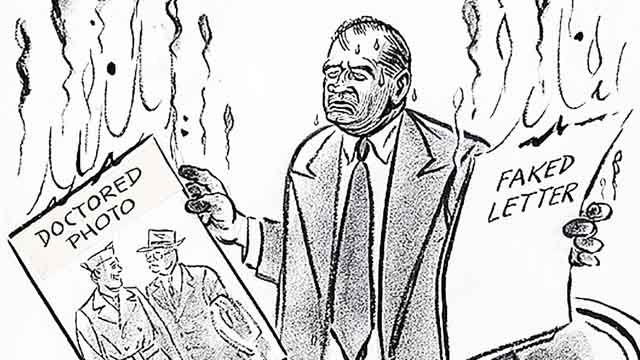Imagine that you are living your life, working your job and all of a sudden you see you or your co-worker instantly lose not only their job, but their entire career. Well this was a possibility in the early 1950s because in that time period, the United States found itself in the grip of a moral panic, one not driven by violence or protest, but by paranoia and accusation. All of this started by 1 man, and his name was Joseph R. McCarthy.
The Era’s Context
The roots of McCarthyism can be traced back to the end of World War II and the beginning of the Cold War. As tensions rose between the United States and the Soviet Union, fears of communist infiltration and espionage began to grip the American public. Events like the Soviet Union’s development of nuclear weapons (1949) and the Chinese Communist Revolution (1949) heightened anxieties, leading many Americans to believe communism was spreading rapidly and posed a direct threat to U.S. democracy.
What is McCarthyism?
McCarthyism refers to the intense anti-communist suspicion and political repression that swept the United States in the early 1950s, led by Senator Joseph McCarthy of Wisconsin. It was a period marked by aggressive investigations, blacklists, and accusations aimed at rooting out supposed communists from positions of influence, particularly within the U.S. government, entertainment industry, and other sectors of American society.
Targets and Victims
Some victims of McCarthyism involve:
- Government employees: Many were investigated and dismissed under suspicion of communist ties, often without fair trials.
- Hollywood: Actors, writers, and directors were targeted by the “Hollywood Ten” were a group of screenwriters and directors who refused to testify and were jailed and blacklisted.
- Academics and educators: Teachers and professors faced scrutiny, with some losing their positions over accusations or refusing to cooperate with investigations.
Joseph McCarthy’s Rise & Fall
Senator McCarthy claimed to have a list of Communist spies to gain public support, though the list was never verified. He used his Senate position to investigate alleged communists, often without credible evidence. His aggressive tactics and public accusations created a climate of fear, leading many innocent people to lose their jobs. McCarthy’s tactics included public accusations, guilt by association, and aggressive questioning, which created a climate of fear and conformity. McCarthy’s influence declined during the 1954 Army-McCarthy Hearings, which exposed his baseless accusations on national television. That same year, the Senate censured him, and he died politically disgraced in 1957, though the effects of his campaign lingered.
Conclusion
McCarthyism remains a great example of how fear and suspicion can lead to chaos, loss of our rights and that we definitely screwed up bad in our past. It is often cited as a cautionary tale about the dangers of demagoguery, mass hysteria, and the abuse of government power. It is important to learn from our past so we can adapt and be more attentive of similar unjust accusations and witch hunts, you never know when it might come in handy.







